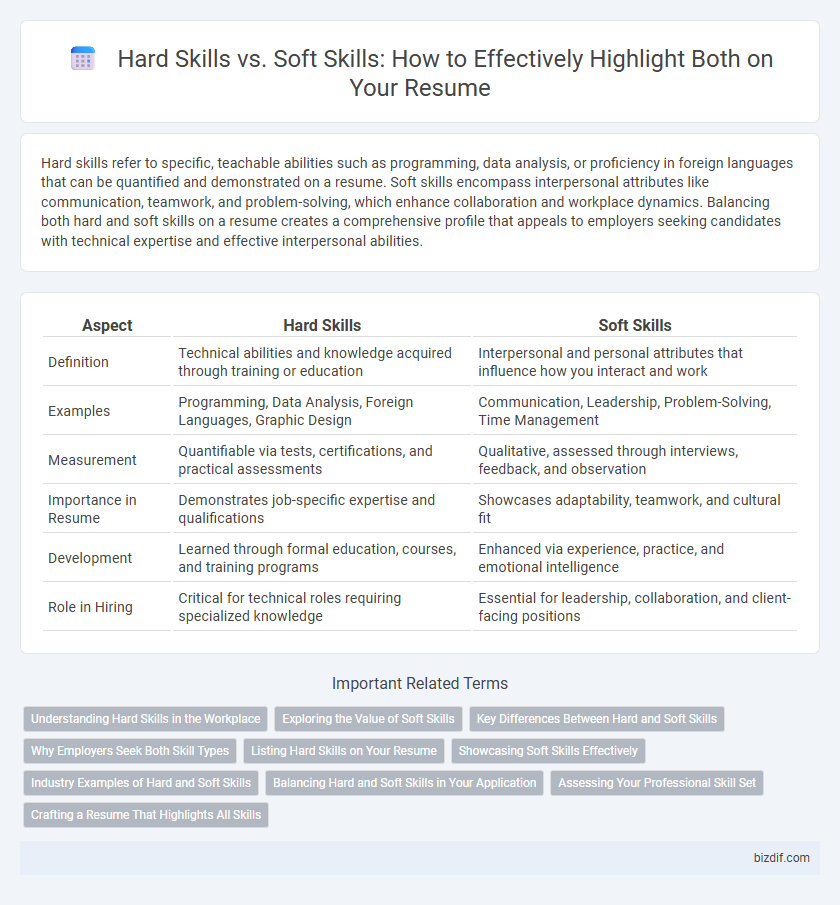Hard skills refer to specific, teachable abilities such as programming, data analysis, or proficiency in foreign languages that can be quantified and demonstrated on a resume. Soft skills encompass interpersonal attributes like communication, teamwork, and problem-solving, which enhance collaboration and workplace dynamics. Balancing both hard and soft skills on a resume creates a comprehensive profile that appeals to employers seeking candidates with technical expertise and effective interpersonal abilities.
Table of Comparison
| Aspect | Hard Skills | Soft Skills |
|---|---|---|
| Definition | Technical abilities and knowledge acquired through training or education | Interpersonal and personal attributes that influence how you interact and work |
| Examples | Programming, Data Analysis, Foreign Languages, Graphic Design | Communication, Leadership, Problem-Solving, Time Management |
| Measurement | Quantifiable via tests, certifications, and practical assessments | Qualitative, assessed through interviews, feedback, and observation |
| Importance in Resume | Demonstrates job-specific expertise and qualifications | Showcases adaptability, teamwork, and cultural fit |
| Development | Learned through formal education, courses, and training programs | Enhanced via experience, practice, and emotional intelligence |
| Role in Hiring | Critical for technical roles requiring specialized knowledge | Essential for leadership, collaboration, and client-facing positions |
Understanding Hard Skills in the Workplace
Hard skills represent the technical abilities and specialized knowledge crucial for specific job tasks, such as coding, data analysis, or proficiency in software tools. Employers prioritize hard skills in resume writing to demonstrate candidates' qualifications and job readiness with measurable competencies. Mastering relevant hard skills enhances employability and aligns with industry standards, making a resume more impactful.
Exploring the Value of Soft Skills
Soft skills such as communication, adaptability, and teamwork significantly enhance workplace performance and leadership effectiveness, often differentiating candidates beyond technical proficiency. Employers increasingly prioritize emotional intelligence and problem-solving abilities to foster collaboration and innovation within teams. Developing these interpersonal skills boosts career advancement opportunities and creates a well-rounded professional profile.
Key Differences Between Hard and Soft Skills
Hard skills refer to technical abilities and knowledge acquired through training or education, such as programming, data analysis, or accounting. Soft skills encompass interpersonal attributes like communication, teamwork, and problem-solving that influence how effectively individuals collaborate and adapt. While hard skills demonstrate job-specific competency, soft skills highlight emotional intelligence and leadership potential crucial for workplace success.
Why Employers Seek Both Skill Types
Employers seek both hard skills and soft skills because hard skills provide the technical expertise necessary to perform job-specific tasks, while soft skills enable effective communication, problem-solving, and teamwork. Hard skills such as coding, data analysis, or project management prove a candidate's ability to execute concrete responsibilities. Soft skills like adaptability, leadership, and emotional intelligence foster a collaborative work environment and drive long-term organizational success.
Listing Hard Skills on Your Resume
Listing hard skills on your resume enhances its impact by showcasing specific, measurable abilities such as programming languages, data analysis, or project management tools. These technical competencies align directly with job requirements, increasing your chances of passing applicant tracking systems (ATS) and catching the recruiter's attention. Emphasizing hard skills backed by certifications or quantifiable achievements strengthens your credibility and demonstrates your job readiness effectively.
Showcasing Soft Skills Effectively
Demonstrating soft skills like communication, teamwork, and problem-solving on a resume requires concrete examples that highlight their impact, such as leading a project or resolving client issues. Quantifying achievements while describing soft skills enhances credibility and relevance to the job description. Integrating soft skills seamlessly with hard skills ensures a balanced presentation that appeals to recruiters seeking well-rounded candidates.
Industry Examples of Hard and Soft Skills
Hard skills in resume writing include industry-specific proficiencies such as Python programming for software development, financial analysis for banking, and CAD design for engineering, demonstrating measurable technical competence. Soft skills like communication, teamwork, and problem-solving are crucial across industries, enhancing collaboration and leadership potential in roles ranging from project management to customer service. Highlighting a balanced mix of hard and soft skills tailored to the target industry increases employability and aligns candidate expertise with job requirements.
Balancing Hard and Soft Skills in Your Application
Balancing hard and soft skills in your resume is essential to showcase both technical expertise and interpersonal abilities, enhancing your overall candidacy. Hard skills such as programming, data analysis, or project management demonstrate your capability to perform job-specific tasks, while soft skills like communication, teamwork, and problem-solving illustrate your ability to collaborate and adapt within a workplace. Highlighting a mix of these skills tailored to the job description increases your chances of passing applicant tracking systems and impressing hiring managers.
Assessing Your Professional Skill Set
Assessing your professional skill set involves distinguishing between hard skills, such as proficiency in software, programming languages, or data analysis, and soft skills, including communication, teamwork, and problem-solving abilities. Highlighting specific hard skills relevant to the job ensures your resume passes applicant tracking systems, while showcasing soft skills demonstrates your capacity to thrive in collaborative work environments. A balanced combination of both skill types enhances your overall marketability to potential employers.
Crafting a Resume That Highlights All Skills
Crafting a resume that highlights both hard skills and soft skills ensures a comprehensive representation of a candidate's capabilities. Hard skills, such as proficiency in software, data analysis, or technical certifications, demonstrate measurable expertise relevant to the job. Soft skills, including communication, teamwork, and problem-solving, convey an applicant's ability to collaborate and adapt within the workplace, making the resume balanced and appealing to recruiters.
Hard skills vs Soft skills Infographic

 bizdif.com
bizdif.com